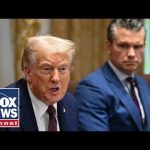This week, Kim Jong Un, the often-memed leader of North Korea, is set to make a grand entrance into China for the first time in six years. His reason for this exclusive trip? A military parade celebrating the 80th anniversary of World War II. It sounds like quite the spectacle, and it’s not just Kim showing up. A whopping 26 other world leaders, including heavyweights like Chinese President Xi Jinping and Russian President Vladimir Putin, will be in attendance. This meeting is stirring up plenty of chatter, especially among those who ponder the growing camaraderie between these nations.
This gathering is significant for multiple reasons. First off, it highlights that Russia and China are solidifying their relationship, which is something that many people in the political sphere, including President Trump, have expressed concern about. Trump has even hinted that he may have had a hand in bringing these two nations and North Korea closer together, implying that it wasn’t his intention. It’s a tangled web of geopolitical maneuvers, and some might liken it to a game of chess, where the stakes are enormous, and each move is watched closely.
The retired Brigadier General John Teichern chimed in during the discussion, pointing out that this emerging relationship is not just limited to China and Russia, but also extends to others like Iran. It appears that these nations are forming a loose alliance of sorts, which should be on the radar of U.S. officials. Unlike the United States, which boasts a network of global allies and partners that have fostered a sense of global order since World War II, these nations may not be as tightly knit yet. Nevertheless, they could become a significant challenge if they continue to collaborate.
With all the cross-talk about which nations are cozying up to each other, it raises the question: What can the U.S. do to diminish these allegiances? Teichern suggests the key lies in nurturing America’s own long-standing relationships rather than attempting to disrupt the partnerships of competitors. Strengthening ties with allies can be a more effective strategy. After all, a united front among allies could counterbalance any new coalitions’ adversaries might dream up.
Meanwhile, in a twist of events, the U.S. has upped its naval presence near Venezuela, sending several warships to monitor and combat illegal activities, particularly relating to narcotics. This display of force would surely get the attention of Venezuelan President Maduro, who considers himself a bit of a tough guy leading a nation steeped in controversy. The added naval ships symbolize a renewed focus on the region, reminiscent of what some are calling a modern version of the Monroe Doctrine. It serves as a warning to remind other nations that the United States is still very much in the game, determined to uphold order and protect its interests in its own backyard.
With tensions running high and the stakes even higher, the developments in China and Venezuela are merely pieces in a greater geopolitical puzzle. The U.S. must navigate these waters carefully, striking a balance between showing resolve and fostering strong alliances with those who share its values and goals. As the global landscape shifts, it’s clear that the proverbial chessboard is alive with potential moves and countermoves that could reshuffle the status quo at any moment.




